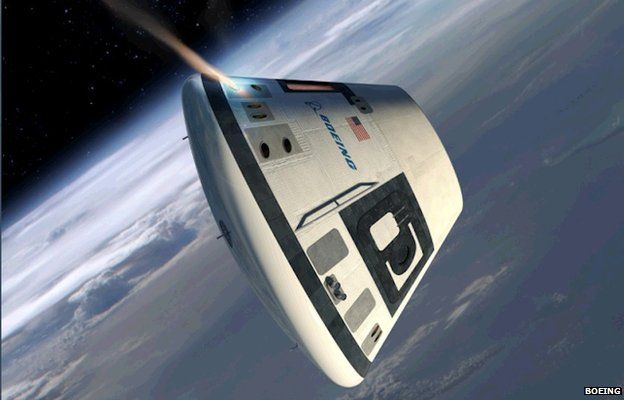Obama seeks to raise Nasa funding
- Published

Boeing's CST-100 capsule could carry up to seven astronauts at a time
US President Barack Obama has requested $18.5bn (£12.3bn), external to run the country's civil space agency, Nasa, in the Fiscal Year 2016.
That would represent a $519m increase on that enacted for FY2015.
The president calls once again for a big jump in funding for the commercial programme that aims to get America launching its own astronauts again.
But the request would also end financial support for the venerable Mars rover Opportunity.
As ever, the proposals are not fixed until agreed with Congress, and the politicians on Capitol Hill always insist on some changes, increasing some budget lines whilst reducing others.
This has certainly been the case in recent years with the commercial crew programme, for which Congress has repeatedly denied the requested funding.
Nasa has contracted the Boeing and SpaceX companies to develop capsule systems to ferry astronauts to and from the space station, with 2017 being their likely entry into service.
To keep this schedule on track, the White House says Nasa will need $1.24bn in FY2016, a more than 50% increase on the $805m it received in 2015.
The Space Launch System should have its maiden outing in 2018
The longer the programme is delayed by a funds shortage, the longer America will have to pay the more expensive seat prices being charged by Russia currently to taxi all nations’ astronauts in its Soyuz rockets and capsules.
Earth record
The friction with Congress on this matter usually involves the amount of money allocated for Nasa’s own deep-space rocket and capsule, known as the Space Launch System and Orion, respectively. These components are what the agency would use to send astronauts to destinations such as asteroids and Mars. An unmanned test launch of the pair is now seen to occur no earlier than late 2018.
The FY2016 request is for $2.4bn, about $345m down on what it is currently being spent. The leading supporters in Congress of these two initiatives are already making their dissatisfaction known.
Among other highlights, the new budget request calls for an “immediate initiation” of a new Landsat spacecraft.
Landsat has built the longest, continuous satellite record of surface change on Planet Earth. It goes back to 1972.
A start now on a Landsat 9 to succeed the recently launched Landsat 8 should ensure this unbroken service is maintained.
Nasa also wants to launch a free-flying infrared sensor to support the Landsat observations.
Long line of succession: Landsat-8 was launched into orbit around the Earth in 2013
But two casualties of the budget request could be the Mars Exploration Rover Opportunity and the Lunar Reconnaissance Orbiter, which is mapping the Moon.
In the president’s request, the budget lines for these two programmes are reduced to zero in FY2016.
It is not a certainty that they will be cancelled, with Nasa stressing it is open to continued operations if the science cases are strong and the relatively small sums of money can be found.
Opportunity, for example, only costs about $14m a year to run.
The bigger threat to its future may be mechanical and/or electronic failure.
The robot has lost the use of some of its instruments, no longer has full movement of its arm and routinely drives backwards because of the wear on its motors. It is also struggling with significant flash memory problems.
But whether its loss is enforced by circumstance or financial reasoning, the passing would be a blow to Opportunity's many fans.
The rover has travelled more than 40km across the surface of Mars in its 10-plus years on the planet.
Opportunity is "forgetful" and "arthritic" but keeps on rolling - more than 40km since landing in 2004
Jonathan.Amos-INTERNET@bbc.co.uk and follow me on Twitter: @BBCAmos, external
- Published5 December 2014
- Published16 September 2014
- Published11 February 2013
- Published10 June 2013